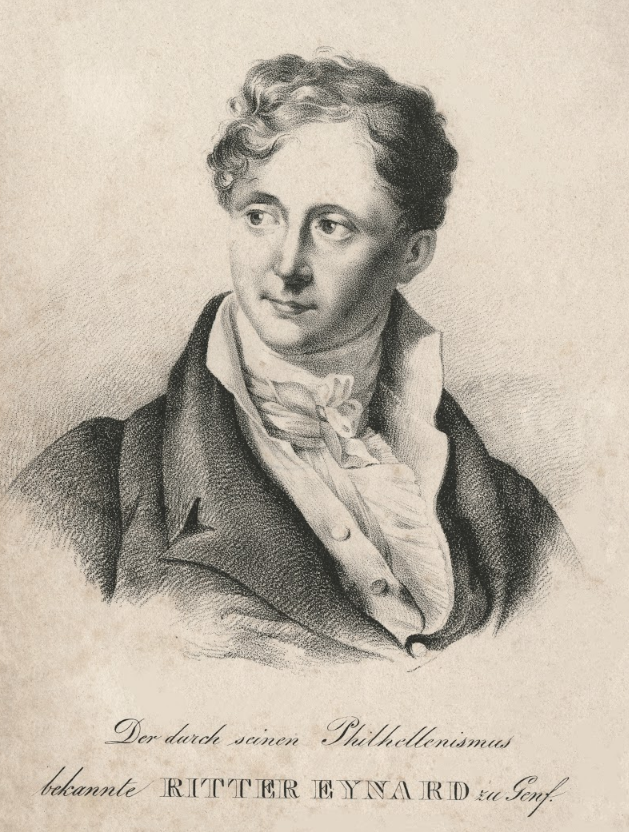Jean-Gabriel Eynard ( 1775-1863 )

Swiss banker, born in Lyon, France, on December 28, 1775. His father, Gabriel-Antoine Eynard, was a banker and merchant from an old noble family. In 1793, during a period of radicalisation of the French Revolution, the Eynard family left France for Rolle, Switzerland. In 1795, Jean-Gabriel and his brother, Jacques Eynard, settled in Genoa and went into business, establishing a trading house. In 1801 Eynard made significant financial gains in Livorno by taking out a loan on behalf of the then King of Etruria. In 1803 he retired from the banking sector and went to Florence, where, in addition to his business activities, he held high public office. In 1808 he became a citizen of Rolle and a Swiss citizen.
In 1814-1815 Eynard attended the Vienna Congress as an ambassador of the Geneva Republic and secretary of the Swiss delegation. There, he developed friendly relations with the representative of Tsar Alexander I and later minister of Foreign Affairs of Russia, Ioannis Kapodistrias, who supported the demands of the Swiss. In 1816 Eynard was called upon to organise Tuscany’s public finances; he also became adviser to Grand Duke Ferdinand.
The outbreak of the Greek War of Independence found Eynard in Geneva, where he had embarked on the construction of an imposing family mansion designed by the Florentine architect Giovanni Salucci. Immediately, Eynard wholeheartedly espoused the Greek cause, leading – as early as the summer of 1821 – to the establishment of the first philhellenic committee in Geneva. After Kapodistrias settled in Geneva, in 1822, Eynard worked closely with the Greek diplomat to promote the Greek cause. A prominent figure of the European philhellenic movement, in the following years Eynard developed extensive activity for the practical support of the Greek revolutionaries by financing Greek fighters, sending food and ammunition, and raising the awareness of the European governments and the international public opinion.
After the landing of Ibrahim’s Egyptian forces in the Peloponnese in 1825, Eynard rallied in European capitals to raise funds; in particular, he supported the besieged Greeks in the town of Missolonghi. In May 1827, in recognising his contribution to the Greek cause, the Third National Assembly at Troezen awarded him the Greek citizenship.
Eynard was instrumental in Ioannis Kapodistrias’s efforts, after he became governor of Greece in 1827, to resolve the pressing financial and social issues wrought by long years of revolutionary action and civil strife. Indeed, Kapodistrias found in the Swiss Philhellene a source for much-needed funds and loans for catering to immediate needs and building the early institutions of the fledgling Greek state.
After the assassination of Kapodistrias in 1831, Eynard showed substantial interest in the economic institutions of the Kingdom of Greece. To this effect, he made a key contribution to the establishment of the National Bank of Greece in 1841; in later years, he became particularly active in promoting Greek issues in major European royal councils. By the late 1840s, Eynard engaged with public affairs less, due to poor health. Nevertheless, he never ceased to be concerned about the Greek affairs until his death in Geneva on February 5, 1863. In recognition of his long years of service to Greece and the Greeks, in 1837 he was awarded the Grand Cross of the Order of the Redeemer.





